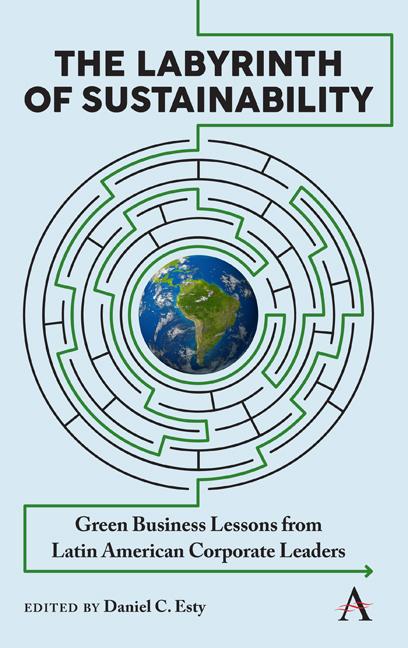Book contents
- Frontmatter
- Dedication
- Contents
- List of Illustrations
- Acknowledgments
- Notes on Contributors
- Introduction
- Chapter 1 Water Conservation in Scarcity Conditions: Corporate Sustainability at Mexico's FEMSA Group
- Chapter 2 Walmart Mexico: Clean Energy to Reduce Costs and Improve Corporate Image
- Chapter 3 Grupo Vanguardia Revitalizes Plastics Recycling in Honduras
- Chapter 4 Nissan Mexicana's Renewable Power Partnership
- Chapter 5 Tecnosol Follows the Sun
- Chapter 6 Rizek Pushes the Dominican Republic Cocoa Industry toward Sustainability
- Chapter 7 Centrosur Leads the Way to Sustainability in Ecuador
- Chapter 8 A Resilient World: Bavaria Builds Its Case on Water
- Chapter 9 Grupo Herdez Takes the Initiative in Mexico's Food Market
- Chapter 10 Chile's Las Palmas Avocado Orchard: Water Consumption Reduction in Agriculture
- Chapter 11 Mabesa: Increasing Global Competitiveness with Eco-friendly Disposable Products
- Chapter 12 Water Use Efficiency Initiatives in Nestlé's Value Chain and the Implications of the Company's Business Model
- Notes
- Index
Chapter 11 - Mabesa: Increasing Global Competitiveness with Eco-friendly Disposable Products
Published online by Cambridge University Press: 29 May 2019
- Frontmatter
- Dedication
- Contents
- List of Illustrations
- Acknowledgments
- Notes on Contributors
- Introduction
- Chapter 1 Water Conservation in Scarcity Conditions: Corporate Sustainability at Mexico's FEMSA Group
- Chapter 2 Walmart Mexico: Clean Energy to Reduce Costs and Improve Corporate Image
- Chapter 3 Grupo Vanguardia Revitalizes Plastics Recycling in Honduras
- Chapter 4 Nissan Mexicana's Renewable Power Partnership
- Chapter 5 Tecnosol Follows the Sun
- Chapter 6 Rizek Pushes the Dominican Republic Cocoa Industry toward Sustainability
- Chapter 7 Centrosur Leads the Way to Sustainability in Ecuador
- Chapter 8 A Resilient World: Bavaria Builds Its Case on Water
- Chapter 9 Grupo Herdez Takes the Initiative in Mexico's Food Market
- Chapter 10 Chile's Las Palmas Avocado Orchard: Water Consumption Reduction in Agriculture
- Chapter 11 Mabesa: Increasing Global Competitiveness with Eco-friendly Disposable Products
- Chapter 12 Water Use Efficiency Initiatives in Nestlé's Value Chain and the Implications of the Company's Business Model
- Notes
- Index
Summary
Abstract
This case study illustrates how an innovative eco-friendly idea can help companies in industries with negative environmental reputations. Mabesa, a Mexican company that made and marketed disposable personal hygiene products, entered a challenging niche market with its Bio Baby diapers, establishing a unique, hard-to-copy product that was substantially more eco-friendly than its competitors. As a result, the company gained greater market share in the premium disposable baby diaper market in Mexico and the United States. The case highlights how even in an industry known for high pollution (the widespread use of disposable diapers comes at high environmental cost), companies can reduce the footprint of products, benefitting the environment, consumers, and businesses.
Introduction
This case study focuses on Grupo P.I. Mabe (Productos Internacionales Mabe S.A. de C.V.), better known as Mabesa, a Mexican company that has manufactured and marketed diapers and other personal hygiene products for the past 40 years. Over that time, Mabesa established itself as one of the leading diaper makers in Latin America, rivaling multinational corporations like Kimberly-Clark and Procter & Gamble. In 2015, Mabesa was Mexico's leading manufacturer of private-label products for disposable baby diapers, disposable adult diapers, and women's sanitary pads. In the same year, Mabesa ranked second in sales of disposable diapers for babies and adults in Mexico, Central America, Spain, and Portugal.
And yet, there is another side to this coin. Environmentalists have long criticized the diaper industry for its wastefulness. For example, 93 billion disposable diapers are discarded worldwide each year. Further, approximately 5 percent of global solid waste is comprised of disposable diapers and other similar hygiene products. Diapers clog landfills— or even worse, they are treated as litter and tossed in ditches, rivers, lakes, or the ocean. Even those that make it into landfills require as long as 300 years to fully decompose because of the large amount of petroleum-based plastics used in their manufacture.
As such alarming environmental news has increasingly become a part of consumers’ decision-making processes, Mabesa officials realized that they had a significant role to play in addressing this problem. With world population surpassing 7.4 billion in 2016, the demand for diapers is only increasing. To address this problem, Mabesa turned to the “premium” niche market.
- Type
- Chapter
- Information
- The Labyrinth of SustainabilityGreen Business Lessons from Latin American Corporate Leaders, pp. 155 - 170Publisher: Anthem PressPrint publication year: 2019



